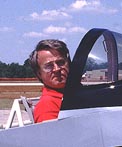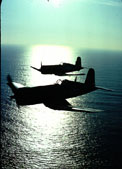Budd Davisson, Plane
and Pilot Magazine Of Warriors and Tomcats Last week a press release from a major museum reminded me that there are some aviation experiences I hope to never have. In several short, proud paragraphs the release bragged about how the museum had just taken possession of one of the F-14D Super Tomcats that had just returned from the very last Tomcat cruise. My reaction was unexpected and immediate: I instantly put myself in the cockpit of that airplane on its last flight and I felt profoundly sad. A little choked up, actually. Picture yourself strapped into that cockpit on short final. You’re all concentration as you play the juggling game that is part of landing any airplane, but when it’s a Tomcat, the number of balls in the air at any one time multiply. You slam onto the runway and feel the straps biting into you as the hurtling mass de-accelerates. Your world is one of electronic screens, neon numbers and ominous placards that say do this but definitely don’t do that. As the airplane slows, you thumb a switch, the canopy slowly yawns open and the noise of the big engines, heretofore a far off whine, crowds into the cockpit along with the cool evening air. Glancing around, as you turn off the runway and unhook your oxygen mask, you notice the crowd at the edge of the ramp awaiting your arrival. Actually, the crowd barely knows you are in the airplane. It is the Tomcat’s show and it dominates the stage just as it has for three decades. In the presence of an F-14 Tomcat, everything else becomes nothing more than a stage prop. Then, just as you’ve done thousands of times before, sometimes while being lashed by foul winds and stinging spray on a tossing deck, your hands dash about the cockpit, throwing switches and moving levers. Almost immediately, one by one, the dozens of sounds that make up the Tomcat’s sound track trail off to nothing. You pull your helmet off and sit it on the top of the windscreen and begin to unstrap. As you do, you can’t help but be aware of the sounds and smells of an airplane coming to rest. The quiet evening air carries the musical “tinking” sounds of cooling hot metal. The unmistakable smell that belongs only to active military airplanes envelops you and you suck it deep into your lungs. It’s the aroma of a sweating, mechanical warrior that you’ve ridden into battle and that has carried you and your country’s colors into harms way and returned. The crowd gathers around the cooling behemoth, mindful not to touch what they know can burn them. The meaning of heat is universal. All cultures understand that where there is heat, there is an energy that can injure. Or it can be directed to do things man cannot do without it. Heat is life and when it is gone, we no longer exist. Everyone admiring the finely shaped aluminum javelin before them understands that. What they don’t understand is that even as they are standing around in their freshly pressed Ralph Laurens and Ray-Bans, the object of their praise, the F-14 Tomcat before them, is giving up its heat for the last time. It is dying. As the pilot you know this, but you do your best not to think about it. After all, it’s just a machine, right? But is it? Is it just a complex sculpture of pipes, wires and aluminum? To those who have never experienced the feeling of slamming the throttle around the horn into full burner, it’s just that, a machine. To those who have never rolled in on an adversary knowing that the magic carpet wrapped around them gives them the edge and their skill is all that stands between them and death, it is a machine. But, you’ve been astride this mount, when it counted and you know better. You’ve heard it breathing. You’ve felt it as it reached beyond itself for performance that wasn’t possible. You’ve seen it read your thoughts and react before your hands begin to move. As with any fine mount in battle, it is a part of you. And you are a part of it. And now, as the festivities begin and the speeches are made, you constantly look over top of the crowd at your old friend and feel helpless. Right there in front of you and everyone else, a gallant warrior is breathing its last. By later tonight the metal will have cooled, the electronics will be relaxed. You know that if you sneak back out under the cover of darkness, you can call forth the magical combination of switches and levers that will bring back the heat. But you also know that’s not going to happen. And you know it will be only a few weeks before a leak develops or a little oxidation breaks an electrical contact. Then, even knowing the magic combination, won’t bring back the life that has been slowly draining away. And you are the one who delivered it to this ignoble end. On the one hand, you’re proud to have served with her and glad to have her in front of the public where her deeds can be recognized. On the other, it’s sad knowing your old friend is now no more than a piece of mechanical taxidermy on display in a static zoo. Cats of all kinds are meant to be wild and free. And true Tomcats of all breeds are meant to launch into the fight some dark night never to return, their energy being absorbed by combat until nothing is left. They live for the fight. I would trade just about anything to have shared five minutes with an F-14 as its partner. But, I couldn’t bear to be the one who delivered a living, breathing Tomcat to its final resting place. Like leaving a faithful pet for the final time, I would never forget the feeling of it looking into my soul and whispering, “Come on, let’s play just one more time. Just one.” I couldn’t live with that. BD |

